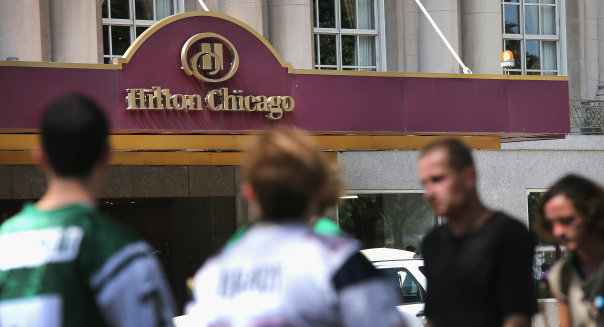
NEW YORK — Hilton Worldwide Holdings Inc. plans to offer approximately 112.8 million shares in an initial public offering of its common stock.
The hotel operator disclosed in a regulatory filing Monday that the offering is expected to price between $18 and $21 a share.
The company anticipates net proceeds of about $1.21 billion, based on the midpoint of the projected price range.
Hilton is offering about 64.1 million shares. Hilton Global Holdings is offering approximately 48.7 million shares.
function jobsearchsubmit_ic(form){var f=document.getElementById(“jobsearchic”);var keywords=document.forms[“jobsearchic”][“keywords”].value;var location=document.forms[“jobsearchic”][“location”].value;f.action=”http://jobs.aol.com/listings/”+keywords+”/”;f.submit();}
The McLean, Va.-based company said it expects to use the offering’s net proceeds and available cash to repay about $1.25 billion of outstanding term loan borrowings under new senior secured credit facilities. If it raises more than currently estimated, remaining funds will be used to pay back more debt or for other general corporate purposes.
Hilton has 4,080 hotels, resorts and timeshare properties. Its brands include Hilton Hotels & Resorts, Waldorf Astoria Hotels & Resorts, and Hampton Inn.
Hilton was taken private by The Blackstone Group investment firm in October 2007 for $20 billion.
The stock is expected to list on the New York Stock Exchange under the ticker symbol “HLT.”
Warren Buffett is a great investor, but what makes him rich is that he’s been a great investor for two thirds of a century. Of his current $60 billion net worth, $59.7 billion was added after his 50th birthday, and $57 billion came after his 60th. If Buffett started saving in his 30s and retired in his 60s, you would have never heard of him. His secret is time.
Most people don’t start saving in meaningful amounts until a decade or two before retirement, which severely limits the power of compounding. That’s unfortunate, and there’s no way to fix it retroactively. It’s a good reminder of how important it is to teach young people to start saving as soon as possible.
1. Compound interest is what will make you rich. And it takes time.
Future market returns will equal the dividend yield + earnings growth +/- change in the earnings multiple (valuations). That’s really all there is to it.
The dividend yield we know: It’s currently 2%. A reasonable guess of future earnings growth is 5% a year. What about the change in earnings multiples? That’s totally unknowable.
Earnings multiples reflect people’s feelings about the future. And there’s just no way to know what people are going to think about the future in the future. How could you?
If someone said, "I think most people will be in a 10% better mood in the year 2023," we’d call them delusional. When someone does the same thing by projecting 10-year market returns, we call them analysts.
2. The single largest variable that affects returns is valuations — and you have no idea what they'll do
Someone who bought a low-cost S&P 500 index fund in 2003 earned a 97% return by the end of 2012. That’s great! And they didn’t need to know a thing about portfolio management, technical analysis, or suffer through a single segment of "The Lighting Round."
Meanwhile, the average equity market neutral fancy-pants hedge fund lost 4.7% of its value over the same period, according to data from Dow Jones Credit Suisse Hedge Fund Indices. The average long-short equity hedge fund produced a 96% total return — still short of an index fund.
Investing is not like a computer: Simple and basic can be more powerful than complex and cutting-edge. And it’s not like golf: The spectators have a pretty good chance of humbling the pros.
3. Simple is usually better than smart
Most investors understand that stocks produce superior long-term returns, but at the cost of higher volatility. Yet every time — every single time — there’s even a hint of volatility, the same cry is heard from the investing public: "What is going on?!"
Nine times out of ten, the correct answer is the same: Nothing is going on. This is just what stocks do.
Since 1900 the S&P 500 (^GSPC) has returned about 6% per year, but the average difference between any year’s highest close and lowest close is 23%. Remember this the next time someone tries to explain why the market is up or down by a few percentage points. They are basically trying to explain why summer came after spring.
Someone once asked J.P. Morgan what the market will do. "It will fluctuate," he allegedly said. Truer words have never been spoken.
4. The odds of the stock market experiencing high volatility are 100%
The vast majority of financial products are sold by people whose only interest in your wealth is the amount of fees they can sucker you out of.
You need no experience, credentials, or even common sense to be a financial pundit. Sadly, the louder and more bombastic a pundit is, the more attention he’ll receive, even though it makes him more likely to be wrong.
This is perhaps the most important theory in finance. Until it is understood you stand a high chance of being bamboozled and misled at every corner.
"Everything else is cream cheese."
5. The industry is dominated by cranks, charlatans and salesmen
13 Major Suburbs Where Poverty Is Soaring
6 Money Leaks That Are Draining Your Finances
Top-Paid Bank CEOs
Spring Cleaning: Getting Rid of the Things You Like to Embrace a Lifestyle You’ll Love
Welcome to the Club, Tea Party: A Brief History of IRS Scandals
More from DailyFinance:
Copyright 2013 The Associated Press. All rights reserved. This material may not be published, broadcast, rewritten or redistributed.


Leave a Reply